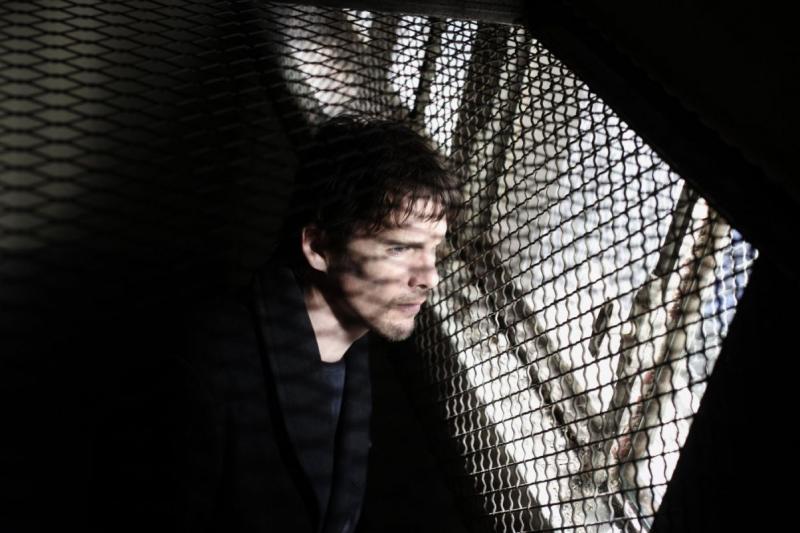Woman In The Fifth: Pawel Pawlikowski. enigmatic, intriguing, mystery

![]()
Woman In The Fifth -Pawel Pawlikowski
Editing is the grammar of movies; their syntax and their punctuation. It renders the images and sequences accessible to us, influencing their meaning and determining the dramatic tone and pace of the film, its narrative and our reaction to both. Parallels with writing are clear: how prose or dialogue is structured affects not only what we understand but also how we respond to it. Unduly extended subordinate clauses (yes dear reader, I appreciate the irony), esoteric vocabulary, inadequate or inconsistent punctuation: all obscure meaning, trip up the reader’s understanding. As beautiful widow Margit (Kristin Scott Thomas) says to writer Tom Ricks (Ethan Hawke), her late husband, also a writer, wrote without punctuation – “making him exceptionally difficult to read.”
You won’t find a better edited film currently than this intriguing, often puzzling, film from Polish born director Pawel Pawlikowski and long-time collaborator and editor David Charap. If editing, like grammar, is the servant of content, then here too Woman In The Fifth (Arrondissement in Paris) is well served as Ryszard Lenczewski’s cinematography is beautifully framed and composed throughout. With most of the techniques of editing rendered invisible and unobtrusive, Woman in The Fifth resonates with a compelling but unsettling mixture of intimacy and detachment which Lenczewski conveys through just focus and composition. In an enigmatic story using a best-selling thriller (Douglas Kennedy) stripped of its murders and plot mechanics, we see Tom either in intimate close-up or always behind something or someone: a fence, people on the tube, in a far corner of a bar. Our perspective on a given scene can change as Lenczewski literally alters our ‘focus’ of interest. If this all sound tricksy, it isn’t; it is done with an impressive subtlety and unobtrusiveness that just slowly builds an atmospheric mixture of ambiguity and menace.
Literature Professor Ricks comes to Paris to try to re-enter his 6-year-old daughter Chloe’s life against the wishes of his deeply hostile, seemingly frightened ex-wife. Warned off and threatened with the police Tom is awoken at the bus terminus having fallen asleep and been robbed of all but his passport. In a sleazy bar he begs a room and the proprietor takes pity on him, eventually offering him a dubious job as night-sentry to an underground set of rooms. His task, to admit only callers offering a password who disappear into another room for vaguely sinister reasons we never discover.
Visiting a literary party Tom makes a beeline for haughtily beautiful widow Margit, multi-lingual, and disturbingly direct. Oddly business-like, the two arrange to meet at Margit’s Flat in the 5th Arrondissement where as the saying has it – haughtiness leads to naughtiness. Again there is an unsettling intensity to Tom and Margit’s relationship: it has no history, nor one feels, future. Meanwhile, as well as starting legal custody proceedings, Tom responds to the interest of the Bar-owner’s young Polish wife Nathalie.
I understand that in the book Kennedy uses Tom as that odd literary device, the unreliable narrator. In the preview I attended at the Curzon with Pawlikowski answering questions afterwards, he hinted that we might see his Tom in a similar way. I dislike this device in literature and am not sure it can be successfully transferred to film. Certainly Tom’s perception of his relationship with his ex-wife diverges from hers but that is not so surprising and we never see any basis for her apparent fear of him.
Pawlikowski has a background in documentary film-making and admitted in questions that he dislikes literary, simple narrative films. It was the character from Kennedy’s book that intrigued him not the traditional thriller genre plot Kennedy placed him in. Pawlikowski’s film looks and feels like a thriller much of the time but in effect he has turned a thriller into a mystery and a straightforward narrative in to a subjective, enigmatic series of events arising from ambiguities in Tom’s character and presenting us with at least one perplexing surprise.
Woman in the Fifth is absorbing, visually engrossing and never dull. Like many film-makers who eschew a literal narrative I’m not sure Pawlikowski is adventurous enough, or develops his characters enough to make the ambiguities and ambivalences in his film disturb as much they might. His film is more taut than tense; more intriguing than exciting.
That said – well worth a visit. The playing is excellent with a welcome return of the engaging Ethan Hawke and another elegant performance from Scott-Thomas but which had Pawlikowski wanted to take her character further, she would have been more than capable of investing with more depth.
http://pinterest.com/atthemovies
Filed under: Pawel Pawlikowski

